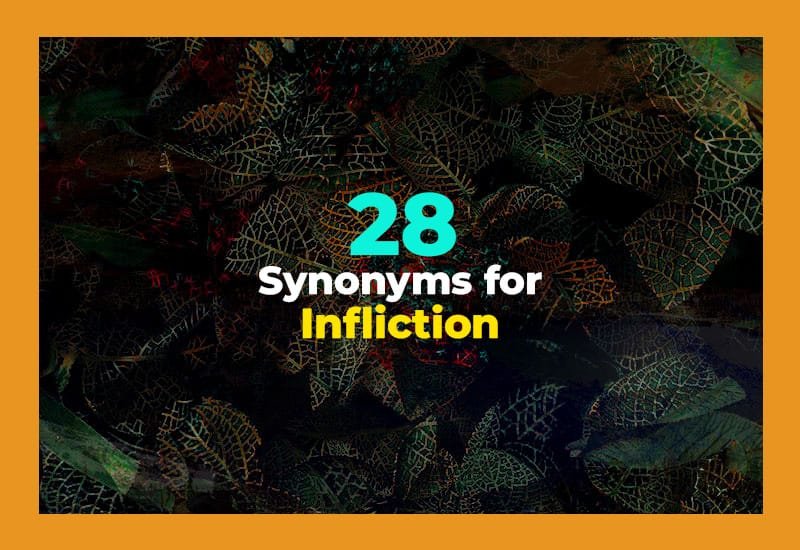When talking about infliction, it usually refers to causing something unpleasant or painful. There are many ways to express this idea, such as punishment, harm, or torment. Each synonym carries a slightly different shade of meaning and works best in certain situations. In this article, we'll explore 28 synonyms for infliction, explain their use, and give examples like suffering, torment, and punishment to help you understand them better.
28 Different Ways to Say INFLICTION: Another Word for Infliction
Imposition
Imposition refers to the act of forcing something onto someone, often creating a burden. This word is commonly used in both legal and social contexts. It works best when someone is made to endure rules, taxes, or restrictions. Using imposition can highlight responsibility or unwanted duty. It is ideal when the focus is on the act rather than the pain caused. Imposition can be mild or severe depending on context, but it always shows an external force acting on someone.
- The government placed a new imposition on all imported goods.
- He resented the imposition of extra work over the weekend.
- Parents often feel the imposition of strict school rules.
Administration
Administration is the process of giving or applying something officially, like medication, punishment, or a policy. This term emphasizes the act of carrying out a process systematically. It is especially useful when referring to structured enforcement. Administration can imply precision and authority. You can use it in medical, legal, or organizational contexts. The word is flexible but often conveys control rather than casual action. Using administration makes your writing sound formal yet descriptive.
- The nurse oversaw the administration of the vaccine.
- The court ordered the administration of community service.
- He was responsible for the administration of company rules.
Enforcement
Enforcement focuses on making rules or laws effective. It is about ensuring compliance and punishing violations. This synonym works best when legal or official action is involved. It emphasizes authority and the consequences of breaking rules. Enforcement can also imply strictness or rigor in execution. Using this word shows a clear structure behind the action. It's perfect when describing policing or monitoring behavior.
- The police ensured the enforcement of traffic regulations.
- Strict enforcement of deadlines improved productivity.
- The school relies on the enforcement of its dress code.
Execution
Execution refers to carrying out a plan, task, or punishment. It emphasizes the completion of an action and its effect on someone. It can relate to legal punishment, military orders, or even business strategies. Execution highlights precision and the finality of an act. It works best when the focus is on the result rather than the intent. Using execution conveys decisiveness and authority in what is being done.
- The execution of the project went smoothly.
- The criminal faced the execution of his sentence.
- Proper execution of plans avoids mistakes.
Delivery
Delivery involves handing over or applying something to someone, often with consequences. It can be used for messages, goods, or penalties. This word works well when the action impacts someone directly. Delivery suggests intention and the result of an act. It is ideal for both tangible and abstract contexts. Using delivery can highlight responsibility and the impact on the recipient.
- The delivery of bad news shocked everyone.
- He ensured the delivery of the punishment as ordered.
- Proper delivery of instructions avoids confusion.
Dispensation
Dispensation is granting permission or exemption while carrying out an action. It is often used in legal, religious, or official contexts. This word shows authority and selective application. Dispensation can also imply flexibility in rules. Using this synonym works well when something is applied with discretion. It highlights control and careful management of actions.
- The manager offered dispensation for late submissions.
- Religious authorities allowed a dispensation from fasting.
- He sought dispensation from the usual regulations.
Application
Application refers to putting something into action or practice. It is used when ideas, rules, or treatments are applied. This synonym emphasizes method and effect. It works well for both tangible and abstract results. Using application conveys effort and execution. It is suitable when highlighting procedure rather than result.
- The application of the new rules was monitored closely.
- Correct application of the ointment healed the wound faster.
- The teacher emphasized the application of theory to practice.
Wreaking
Wreaking describes causing destruction, damage, or suffering intentionally. It is strong and often associated with violence or chaos. This synonym works best when the result is severe or dramatic. Wreaking highlights action and effect vividly. Using it conveys intensity and often anger or force. It is perfect for dramatic storytelling or strong warnings.
- The storm was wreaking havoc across the city.
- He was guilty of wreaking emotional pain on his friends.
- Wreaking destruction on the battlefield caused panic.
Causing
Causing is a direct term for bringing about something, usually an effect or result. It's flexible and can apply to both positive and negative outcomes, though commonly negative here. This synonym works well when describing responsibility or consequence. Using causing shows clarity in action and result. It emphasizes the link between act and effect clearly.
- Smoking is causing serious health problems.
- His careless words were causing tension in the office.
- The accident was causing traffic delays.
Dealing
Dealing refers to taking action or applying something to someone, often in controlled situations. It emphasizes management or response to circumstances. This word works when highlighting interaction or handling of an issue. Using dealing can soften harsh actions while still showing responsibility. It's suitable for personal, business, or social contexts.
- She was dealing with complaints from customers.
- The officer was dealing with the offender professionally.
- He spent the day dealing with paperwork.
Hurling
Hurling is a dramatic synonym for throwing or causing harm forcefully. It emphasizes speed and impact. This word is vivid and often used for strong actions, including words, objects, or consequences. Using hurling captures emotion and intensity. It is best for writing that needs energy and clear action.
- He was hurling insults at his opponent.
- The storm was hurling debris across the streets.
- She kept hurling questions at the speaker.
Imposing
Imposing describes forcefully placing something onto someone. It highlights dominance or authority. This synonym works well when rules, opinions, or restrictions are applied. Using imposing conveys strength and inevitability. It is ideal when showing the weight of responsibility or pressure.
- The teacher was imposing strict rules on students.
- They were imposing their ideas on everyone.
- New taxes were imposing extra financial pressure.
Incurring
Incurring refers to becoming subject to something, usually unwanted, due to one's actions. It emphasizes consequence. This synonym is perfect for penalties, debts, or criticism. Using incurring highlights cause and effect. It works well in legal, financial, or professional contexts.
- He was incurring fines for late payments.
- The company risked incurring legal action.
- She was incurring criticism for her decisions.
Bearing
Bearing means carrying a burden, responsibility, or consequence. It emphasizes endurance. This synonym works well for both physical and emotional contexts. Using bearing shows resilience and acceptance. It is perfect for highlighting effort, responsibility, or suffering.
- He was bearing the cost of his mistakes.
- She is bearing the pain silently.
- Soldiers bear heavy responsibilities in war.
Endurance
Endurance emphasizes the ability to withstand pain, stress, or suffering. It highlights patience and resilience. This synonym works best for long-term challenges. Using endurance shows strength and perseverance. It is suitable for personal growth, physical training, or hardship situations.
- Marathon runners rely on endurance.
- The villagers showed endurance during the harsh winter.
- She built endurance to face emotional challenges.
Onset
Onset refers to the beginning of something, often unpleasant. It emphasizes timing and arrival. This synonym works well for diseases, events, or crises. Using onset captures the start and immediate effect. It is ideal for warnings or observations.
- The onset of winter brought heavy snow.
- Early onset of fatigue affected his performance.
- The doctor warned about the onset of symptoms.
Affliction
Affliction describes severe suffering or hardship. It emphasizes the personal impact. This synonym works best for emotional, physical, or social pain. Using affliction highlights intensity and experience. It is suitable for storytelling or empathetic writing.
- Poverty is an affliction for many families.
- She faced affliction after losing her job.
- Chronic illness became her daily affliction.
Punishment
Punishment is a direct word for consequences imposed due to wrongdoing. It emphasizes justice or correction. This synonym works well in legal, school, or social contexts. Using punishment conveys accountability. It is perfect for rules, discipline, or moral consequences.
- He received punishment for breaking the law.
- The teacher assigned detention as punishment.
- Punishment was necessary to maintain order.
Trauma
Trauma refers to deep emotional or physical suffering caused by an event. It emphasizes lasting effects. This synonym works best for intense experiences. Using trauma highlights impact and recovery needs. It is suitable for psychology, health, or storytelling contexts.
- The accident caused lasting trauma.
- Childhood trauma affects adult behavior.
- Witnessing violence led to severe trauma.
Torment
Torment describes extreme suffering, often mental or emotional. It emphasizes intensity and persistence. This synonym works well for personal or dramatic situations. Using torment highlights distress vividly. It is ideal for writing about inner struggles or hardships.
- He was in torment after the betrayal.
- The prisoner endured mental torment.
- She felt torment over the lost opportunity.
Suffering
Suffering refers to experiencing pain, distress, or hardship. It emphasizes the lived experience. This synonym works well in both physical and emotional contexts. Using suffering conveys empathy and realism. It is suitable for stories, health, or social issues.
- The community faced suffering during the flood.
- He experienced suffering after the injury.
- Suffering taught her resilience.
Ordeal
Ordeal refers to a severe or trying experience. It emphasizes challenge and endurance. This synonym works best for intense situations. Using ordeal highlights struggle and eventual outcome. It is perfect for dramatic or narrative writing.
- Climbing the mountain was a real ordeal.
- The surgery became an ordeal for the patient.
- They survived the ordeal of the storm.
Wounding
Wounding describes causing physical or emotional injury. It emphasizes impact. This synonym works well for violence, accidents, or insults. Using wounding highlights harm clearly. It is ideal for dramatic or literal contexts.
- The knife caused serious wounding.
- His words were emotionally wounding.
- The accident resulted in wounding to several workers.
Damage
Damage refers to harm that reduces value or function. It emphasizes effect. This synonym works well for physical, financial, or emotional contexts. Using damage shows results of actions clearly. It is suitable for reports or storytelling.
- The storm caused extensive damage.
- Poor choices damaged his reputation.
- The accident damaged the equipment.
Harm
Harm is a general term for causing injury or negative effect. It emphasizes impact. This synonym works well for safety, health, and social situations. Using harm conveys risk or consequence clearly. It is ideal for warnings or advice.
- Smoking can harm your health.
- Harsh criticism may harm relationships.
- Pollution harms the environment.
Cruelty
Cruelty highlights deliberate and severe harm, often emotional or physical. It emphasizes intent. This synonym works best for describing behavior or actions. Using cruelty conveys moral judgment. It is perfect for social commentary or storytelling.
- The cruelty of the villain shocked everyone.
- Animal cruelty is punishable by law.
- She was shocked by the cruelty of her peers.
Violence
Violence refers to the use of physical force to cause harm. It emphasizes aggression and impact. This synonym works best for physical conflicts or dangerous situations. Using violence highlights severity and threat. It is ideal for reporting or narratives.
- The protest turned into violence.
- Domestic violence affects many families.
- War brought widespread violence.
Synonym Table
| Synonym | Example |
|---|---|
| Imposition | He resented the imposition of extra work over the weekend. |
| Administration | The court ordered the administration of community service. |
| Enforcement | The police ensured the enforcement of traffic regulations. |
| Execution | The criminal faced the execution of his sentence. |
| Delivery | The delivery of bad news shocked everyone. |
| Dispensation | Religious authorities allowed a dispensation from fasting. |
| Application | Correct application of the ointment healed the wound faster. |
| Wreaking | The storm was wreaking havoc across the city. |
| Causing | His careless words were causing tension in the office. |
| Dealing | She was dealing with complaints from customers. |
| Hurling | He was hurling insults at his opponent. |
| Imposing | The teacher was imposing strict rules on students. |
| Incurring | He was incurring fines for late payments. |
| Bearing | Soldiers bear heavy responsibilities in war. |
| Endurance | Marathon runners rely on endurance. |
| Onset | The doctor warned about the onset of symptoms. |
| Affliction | Chronic illness became her daily affliction. |
| Punishment | The teacher assigned detention as punishment. |
| Trauma | Witnessing violence led to severe trauma. |
| Torment | The prisoner endured mental torment. |
| Suffering | The community faced suffering during the flood. |
| Ordeal | Climbing the mountain was a real ordeal. |
| Wounding | His words were emotionally wounding. |
| Damage | The storm caused extensive damage. |
| Harm | Pollution harms the environment. |
| Cruelty | Animal cruelty is punishable by law. |
| Violence | Domestic violence affects many families. |

Final Thoughts
Exploring different ways to say infliction helps add variety to writing. Each synonym carries its own nuance and makes communication more precise. Using these words carefully allows you to express pain, punishment, or suffering effectively and with clarity.









